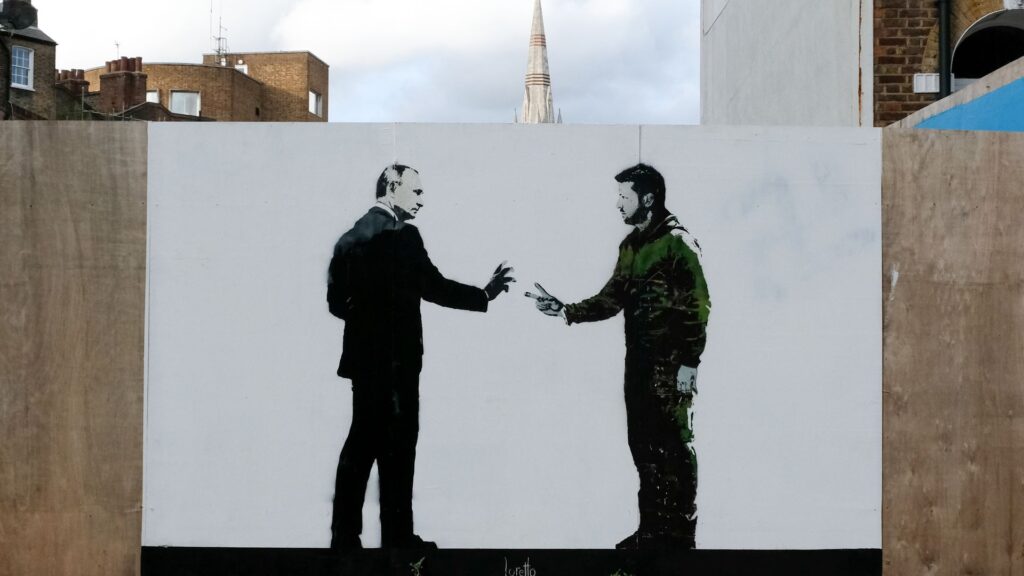Moscow and Kyiv could engage in direct talks in Istanbul next week, marking the potential for a significant turning point since Russia’s 2022 invasion of Ukraine. This comes after Russian President Vladimir Putin turned down an unconditional 30-day ceasefire proposal drafted Saturday, May 10, by the leaders of four European nations in conjunction with Ukrainian President Volodymyr Zelenskyy.
The United Kingdom, Germany, France and Poland drew up a ceasefire proposal, which has the endorsement of U.S. President Donald Trump, to begin Monday, May 12. Those four countries are part of a 30-nation group known as the “Coalition of the Willing,” which is working towards a peace agreement.
What did Putin say, exactly?
In a statement for Russian media that Putin read out around 2 a.m. local time Sunday, May 11, he rejected the proposal and instead suggested that the two countries should engage in direct talks “without preconditions.” However, he also stipulated any agreement needs to ensure a “lasting peace” that doesn’t allow Ukraine to rearm or build up its military forces, according to The Associated Press.
While Putin’s comments left room for speculation about whether he would be personally participating in the talks, Zelenskyy made it clear he would be “waiting” in Istanbul on Thursday, May 15.
Zelenskyy maintains ceasefire demand
“We await a full and lasting ceasefire, starting from tomorrow, to provide the necessary basis for diplomacy,” Zelenskyy wrote on X, referencing Saturday’s ceasefire draft. He added, “There is no point in prolonging the killings. And I will be waiting for Putin in (Turkey) on Thursday. Personally. I hope that this time the Russians will not look for excuses.”
Zelenskyy has stressed the importance of a ceasefire beginning Monday, in line with the Coalition of the Willing proposal, saying it must last 30 days “to give diplomacy a real chance.” On Sunday, he doubled down on that demand, writing, “There is no point in continuing the killing even for a single day. We expect Russia to confirm a ceasefire – full, lasting, and reliable – starting tomorrow, May 12th, and Ukraine is ready to meet.”
How is US leadership responding?
Shortly before Zelenskyy’s comments, Trump, who has been at odds with both Ukraine and Russia since taking office and trying to negotiate an end to the war, wrote on Truth Social that Kyiv should agree to Russia’s offer of direct talks “immediately.”
“At least they will be able to determine whether or not a deal is possible, and if it is not, European leaders, and the U.S., will know where everything stands, and can proceed accordingly!” Trump added.
The U.S. special envoy to Ukraine and Russia, retired Lt. Gen. Keith Kellogg, seemed to back Saturday’s proposal, writing on X Sunday morning, “As President Trump has repeatedly said, stop the killing!! An unconditional 30 day ceasefire first and, during it, move into comprehensive peace discussions. Not the other way around.”
What’s at stake?
Putin and Zelenskyy have only met once, in 2019, some three years before Russia launched its invasion. Following the invasion, however, Zelenskyy pushed for a personal meeting with his counterpart in Moscow, only to abandon those efforts in September 2022 after Russia illegally annexed parts of four Ukrainian territories.
Russia’s demand for face-to-face talks appears to be an attempt at wresting some sort of control back from Ukraine and its Western allies. On Saturday, following the announcement of the ceasefire draft proposal, Kremlin spokesperson Dmitry Peskov said that European statements on the matter are “generally confrontational,” and that “trying to pressure us is quite useless.” Then, on Sunday, Peskov asserted that Putin’s proposal is “very serious” and “confirms a real intention to find a peaceful solution” that addresses “the root causes of the conflict,” the AP reports.
Putin has reportedly spoken to Turkish President Recep Tayyip Erdogan about hosting the talks.
It’s unclear exactly what the terms of a ceasefire or end to the war would entail, or what either country would have to concede in order to achieve lasting peace. Putin has maintained that Russia’s continued control of Crimea and other territories it has taken over since launching its invasion is crucial to any potential deal, something Trump has supported in the past. Meanwhile, however, British Prime Minister Keir Starmer said Saturday that the European leaders are demanding “an unconditional ceasefire” and that they are “rejecting Putin’s conditions.”


